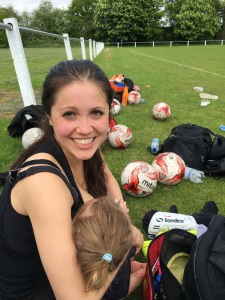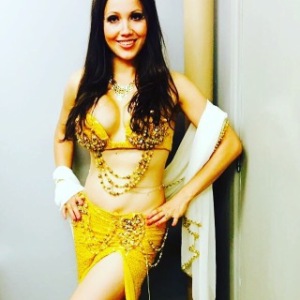A top TV presenter refuses to look at the media’s “sidebar of shame” and the press as we are all too often comparing and judging one another.


Davina McCall was speaking at MumsNet’s blogging conference #BlogFest16 in which she explained how we all tend to post our best photos on social media rather than the more realistic ones.
She said: “I posted a photo of me working out on social media and someone commented that I looked skinny.
“Well I’m actually a size 10-12 and it took me 40 photos to get that one.”
But sadly not everyone is as open and honest as Davina, leaving us all with a warped perception of what people look like.
And that’s where Davina praised us bloggers for helping to show real-life.
Although I think we can all be guilty of using filters and choice angles!
I try to reflect the real-side of my life which normally involves me running around in my gym kit, no make up and with my hair scraped back.

Body confidence and beauty come from within
I used to hate my body no matter how thin, fat or curvy I was. It is now ‘normal’ to loathe oneself, but it shouldn’t be. All too often when I teach dance I hear so many people slagging off their own features. This has taught me a lot because I genuinely only see the best in the women I teach.
And over time, I’ve tried to practice what I preach by saying to myself that my body is worthy.
Recently I spoke on the radio about body confidence in light of TV pundit Claire Balding’s new kids book which features a female jockey with “big thighs.” I.e. our bodies have a purpose!
I have big hips which help me to bellydance beautifully, I have a round smiley face which helps me to put people at ease and I have muscular legs which helps me to run everywhere with the buggy.

SO rather than self-depreciating I’d love you to tell me about your fabulous features by commenting below!
I created this post as a competition entry in support of Dove and the Be Real Body Image Pledge @DoveUK #PledgeToBeReal campaign & competition.
The facts are:
- 80% of women and girls wish the media did a better job portraying realistic and diverse body image
- Dove is founding partner of Be Real, a national movement to change attitudes towards body image, and one of the first brands to support the Be Real Body Image Pledge
- The Be Real Body Image Pledge encourages organisations to promote the responsible portrayal of body image in advertising, media, fashion and music
Today Dove is taking an important step in fighting body image anxiety in the UK by leading the call to action to join the Be Real Body Image Pledge, part of a national movement campaigning for the advertising, fashion, music and media industries to show more reality and diversity.
The announcement of the Pledge comes on the heels of the 2016 Dove Global Beauty and Confidence Report, which found 74% of women and 67% of girls in the UK think the media and advertising set an unrealistic standard of beauty most women can never achieve. And about 4 in 10 (42%) women feel worse about themselves after looking at images of beautiful women in magazines.
The impact of being constantly bombarded by body and appearance related messages can have far-reaching consequences on women and girls, causing them to doubt their abilities and opt-out of fundamental life activities. The same Dove report found that almost all women (89%) in the UK with low body-esteem will avoid important life activities – such as seeing family or leaving the house – if they don’t feel good about the way they look. And nearly all girls (88%) admit to stopping themselves from eating or not seeing a doctor when they are unhappy with their appearance.
By signing up to the Pledge, Dove is calling for the responsible portrayal of all people in the media and advertising, and especially women and beauty.
“For 60 years, Dove has stood for Real Beauty – it only uses real women in its advertising and follows a strict policy on airbrushing and photoshop,” says Mark Bleathman, Vice President Personal Care at Unilever UK Ltd. “That’s why we are so passionate about Dove taking a leadership role on the Be Real Body Image Pledge – the time to end body image anxiety is now, and Dove is fully committed to driving change in the UK for the benefit of everyone.”
Organisations that sign up to the Pledge are committing their intention to reflect diversity and reality in their messages and advertising, and to promote health and wellbeing. It also indicates an intention to promote the Pledge amongst staff, and in external communications to consumers. The Pledge is designed to provide direction for brands and advertisers that want to help encourage healthy body image amongst the UK public.
This is the latest step in the brand’s ongoing commitment to create a world where beauty is a source of confidence, not anxiety. In 2004, the Dove Self-Esteem Project was founded to help the next generation of women and men develop a positive relationship with the way they look and reach their full potential. Through proven self-esteem education, it has positively impacted the lives of over 19 million young people around the world, and over two million young lives in the UK.
Commenting on the launch, Mary Glindon, MP, Co-Chair of the Be Real Campaign says, ‘It’s clear that body image anxiety, caused by the unrealistic standards of beauty we see in adverts, magazines and social media, has a direct impact on women’s health and self-esteem. And we know 90% of adults want to see a broader range of body shapes in advertising and the media. By signing up to the Be Real Body Image Pledge, companies and media organisations can become part of a movement to deliver real change for people across the country.’
Join Dove and show support for the Pledge by sharing the hashtag #PledgeToBeReal on social media. To find out more and how you can get involved, go to www.Dove.com.
Further reading…
The importance of the Be Real Body Image Pledge is underlined by data from The Dove Global Beauty and Confidence Report, published earlier this year, which shows that low body confidence among women in the UK has reached critical levels. Women and girls feel pressured by unrealistic beauty standards in the media
8 in 10 (78%) UK women and 7 in 10 (74%) girls think very few real women and girls look like those featured in the media
7 in 10 (74%) UK women and 67% girls believe the media and advertising set an unrealistic standard of beauty that most women can never achieve
Over the last 10 years, the UK has made some progress on the accurate portrayal of women in advertising, but it’s clear more work is needed The bombardment of body-focused images and advertisements has a direct impact on women and girls’ self-esteem, leading them to hold back from important life activities
4 in 10 (42%) UK women feel worse about themselves after looking at beautiful women in magazines
9 in 10 (89%) UK women and girls (85%) with low body-esteem report opting out of important activities outside the house, and trying out for a team or club when they don’t feel good about the way they look. 6 in 10 (57%) of British women and 8 in 10 (76%) girls with low body-esteem will not be assertive in their opinion or stick to their decisions when they don’t feel good about the way they look – this includes skipping a job interview, missing work or asking for help when they need it
Almost all women (90%) and girls (88%) with low body-esteem in the UK have stopped themselves from eating or otherwise put their health at risk (e.g. not seeing a doctor), because they don’t feel good about the way they look And the demand for change is huge
8 in 10 (80%) UK women and girls wish the media did a better job of portraying women with diverse physical appearance, and of varying age, race, shape and size
YMCA research shows 90% of adults would like to see a broader range of body shapes in advertising and the media How the Be Real Body Image Pledge can help change attitudes towards body image
The Be Real Body Image Pledge is a set of core principles for promoting real diversity in advertising, fashion, music and the media. It calls for businesses, publishers, editors and advertisers to act responsibly by positively promoting different body shapes and sizes, people with and without disabilities, and all ages, genders and ethnicities.
Organisations that sign up pledge to reflect diversity, reflect reality, promote health and wellbeing and promote the Pledge and its values. The Pledge marks the latest step in Dove’s commitment to helping women and girls feel positive about the way they look
In 2004, Dove created the Dove Self-Esteem Project to help the next generation of women see beauty as a source of confidence, not anxiety
To date, Dove has positively impacted the lives of more than 19 million young people around the world, and has reached over two million lives in the UK.
Go to www.Dove.com for more information.
